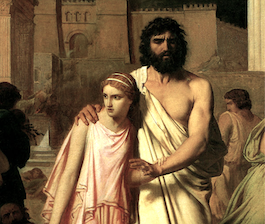Oedipus Rex in a Nutshell
- JOSEPH PEARCE
Oedipus Rex by Sophocles is more than merely a tragedy.
 It is a profound meditation on the relationship between fate and free will and on the consequences of that relationship with respect to the mystery and meaning of human suffering. Its plot is convoluted and provocative. Oedipus becomes King of Thebes after answering the riddle of the Sphynx. Earlier, he had unwittingly killed his own father, Laius, and equally unwittingly married his own mother, Jocasta, having several children by her, including Antigone, the eponymous heroine of the play by Sophocles which we discussed last time. After Oedipus discovers the full horror of his situation, he stabs himself in both eyes, blinding himself in a fit of madness. The play ends with him clinging to his two young daughters, Antigone and Ismene, before being forcibly separated from them.
It is a profound meditation on the relationship between fate and free will and on the consequences of that relationship with respect to the mystery and meaning of human suffering. Its plot is convoluted and provocative. Oedipus becomes King of Thebes after answering the riddle of the Sphynx. Earlier, he had unwittingly killed his own father, Laius, and equally unwittingly married his own mother, Jocasta, having several children by her, including Antigone, the eponymous heroine of the play by Sophocles which we discussed last time. After Oedipus discovers the full horror of his situation, he stabs himself in both eyes, blinding himself in a fit of madness. The play ends with him clinging to his two young daughters, Antigone and Ismene, before being forcibly separated from them.
The moral of the play is framed by the riddle of the Sphynx: What goes on four feet in the morning, two feet at noon, and three feet in the evening? The answer is Man, who crawls as an infant and hobbles with the help of a stick in old age. The riddle serves, therefore, as an aphoristic portrayal of Man himself whose life begins and ends in weakness and utter dependence on others, with an interlude of seeming strength in between. The riddle provides what might be called the ecce homo symbolic epigraph, enabling Sophocles to present the axiomatic truth of Man’s pathetic weakness as the core of the tragedy. Behold Man!
Oedipus is the man who not only answers the riddle but is himself the answer to it. As we discover in the play’s denouement, he was utterly helpless as a baby and is left to die by those responsible for caring for him; he comes of age as King of Thebes and then is doomed to being utterly dependent on others following his act of self-mutilation. As the answer to the riddle, he becomes not merely the tragic figure of one man doomed by circumstance but a representative of Everyman who is similarly doomed. In this sense, at least in some sense, Oedipus is us. The lessons he learns are applicable to all of us.
Apart from the riddle of the Sphynx which frames it, Oedipus Rex is itself a riddle, or a series of riddles. To what extent is Oedipus ignorant of the crimes he commits and the taboos he breaks? To what extent does his ignorance signify his innocence? To what extent is life governed by fate? Does fate nullify the reality of human freedom? If everything is governed by fate, is free will illusory or, if not illusory, futile? And if free will is illusory or futile, can humans be held responsible for their actions?
The riddles continue. If Oedipus can be held blameless with respect to his ignorance or with respect to the evil done to him when he was a helpless child, is he not blameworthy for his hubris, especially in his rage-driven attacks on the blind prophet Tiresias? And even if Oedipus, like King Lear, is more sinned against than sinning, what of his father and mother, Laius and Jocasta, who freely chose to leave their child to die in the mountains or be eaten by wild beasts? Does the blindness of fate exonerate them?
As the foregoing illustrates, "Oedipus Rex" begins with the answering of one riddle and ends with the posing of many others, none of which appear to be answered.
What of the helpless children? What of Antigone and Ismene? How can they be blamed? How can they be considered anything but innocent victims? And where are the gods? Are they present or absent? How can they permit this monstrous fate to play itself out? How can they be free from blame?
And what of ignorance? Can it be bliss? Would it have been better if Oedipus had never asked the questions which led to the horrific revelations and their even more horrific consequences? If it would have been better, as Tiresias says, for Oedipus to remain ignorant of the truth, why did the gods send a plague upon the people of Thebes for the failure to bring Laius’ killer to justice?
If Laius and Jocasta received their just deserts for their intention of killing their own infant son, can we be comfortable with the price that the innocent son has to pay for such justice to be done? Isn’t Oedipus’ fate the adding of insult to injury?
As the foregoing illustrates, Oedipus Rex begins with the answering of one riddle and ends with the posing of many others, none of which appear to be answered. It is for this reason that Oedipus Rex is so often taught in the (post)modern academy as exemplifying the meaninglessness of life. Life is senseless. It makes no sense. It’s all meaningless suffering and nothing else. It’s nothing but endless riddles to which there are no answers. As we shall see, however, Sophocles offers answers to all the riddles that he poses in Oedipus Rex in the play which is its sequel, Oedipus at Colonus, which will be the next great work to be discussed “in a nutshell. ”
 This is Meaghen Gonzalez, Editor of CERC. I hope you appreciated this piece. We curate these articles especially for believers like you.
This is Meaghen Gonzalez, Editor of CERC. I hope you appreciated this piece. We curate these articles especially for believers like you.
Please show your appreciation by making a $3 donation. CERC is entirely reader supported.

Acknowledgement
 Joseph Pearce. "Oedipus Rex in a Nutshell." Crisis Magazine. (April 24, 2021).
Joseph Pearce. "Oedipus Rex in a Nutshell." Crisis Magazine. (April 24, 2021).
This article is reprinted with permission from Crisis Magazine.
The Author
 Joseph Pearce is Director of Book Publishing at the Augustine Institute, editor of the St. Austin Review and series editor of the Ignatius Critical Editions. Among the books he has authored are: Benedict XVI: Defender of the Faith, Literature: What every Catholic should know, Tolkien: Man and Myth, C. S. Lewis and the Catholic Church, Literary Catholics, Race With the Devil: My Journey from Racial Hatred to Rational Love, Beauteous Truth: Faith, Reason, Literature and Culture, Through Shakespeare's Eye, J.R.R. Tolkien's Sanctifying Myth: Understanding Middle-Earth, Unafraid of Virginia Woolf, Solzhenitsyn, and Old Thunder: A Life of Hilaire Belloc.
Joseph Pearce is Director of Book Publishing at the Augustine Institute, editor of the St. Austin Review and series editor of the Ignatius Critical Editions. Among the books he has authored are: Benedict XVI: Defender of the Faith, Literature: What every Catholic should know, Tolkien: Man and Myth, C. S. Lewis and the Catholic Church, Literary Catholics, Race With the Devil: My Journey from Racial Hatred to Rational Love, Beauteous Truth: Faith, Reason, Literature and Culture, Through Shakespeare's Eye, J.R.R. Tolkien's Sanctifying Myth: Understanding Middle-Earth, Unafraid of Virginia Woolf, Solzhenitsyn, and Old Thunder: A Life of Hilaire Belloc.




